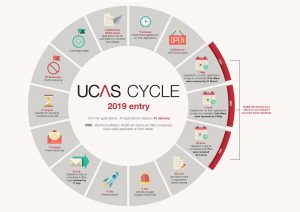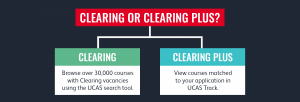If you are in the process of applying abroad for your higher education, then you must have come across the process of ‘clearing’. What is this process about? what are the eligibility criteria? and under what circumstances it is carried out?
UCAS clearing process is for undergraduates who haven’t received offer letters from the universities they have applied for in the UK. The basic concept of this process is to match universities with unfilled seats with the students who haven’t received offer letters.
There are numerous benefits to this process. There might be cases when things simply do not go according to plan while applying to university, like instances when exams do not go as planned and thus students are unable to meet the requirements of their chosen university, or when students received better results than anticipated and want to change their original university choice. The Clearing system is also helpful when students have received an offer but do not want to take it up since they would like to study at another university.
Is clearing for International students?
The answer is yes, clearing can be utilized by international students as well as the local students. The condition is that you have applied through UCAS (Universities and Colleges Admissions Service). Through the process of clearing, you are informed about so many unallocated university places. From which you can choose according to your liking and convenience.
A few things you should know, as an international student using Clearing. That if you have firm insurance offers from universities in the UK, you will not know your Clearing status until confirmations of your results have been received.
If you do not have either firm or insurance offers, then you can apply to courses using Clearing as soon as you receive your results. As an international student, please make sure that you have enough time to apply for a UK visa (when applicable). Moreover, check your UCAS Track on the same day that you get your results.
International students might also be asked to take a few tests. Such as a language test, to secure your place and some universities might even require to interview you online. The best thing would be to check with the university you are interested in, so you can find out what their requirements are. Keep in mind that you are also required to pay an application fee to enter Clearing.
How Should I Use Clearing as an International Student?

The clearing process is the same for both international and national students. The language or different time zones can be a hindrance at times, but there is nothing you can do about it. The dates of UCAS clearing start from July 6 and ends on 20 October. As universities are trying to fill their numbers during this period.
Students who haven’t received an offer letter or met entry requirements by default enter into the clearing process. So if your application has been made before June 30th and you haven’t secured a seat then you automatically enter into the clearing process. Without your exam results under any circumstances, you won’t be able to apply through clearing.
The moment you receive your exam results and find that they do not match the requirements for your offer. Go to the UCAS website and confirm your Clearing eligibility. You should also do this in case you are late to apply for university. You will then receive a Clearing number which will be used by universities while evaluating your application. After receiving your Clearing number, you have the option of calling universities (either through phone or online) to make your application for available courses.
A few tips to remember when applying through Clearing:
- Be available on results day.
- Make a list of preferred UCAS Clearing courses/universities so it’s easier when going through listings.
- Check UCAS Track regularly. if you become eligible, you will find an ‘add Clearing choice’ option on your Track Choices.
- Call universities directly/right away. Keep in mind that some university courses might get filled quite quickly, so make sure you act wisely and in time.
- Check the official Clearing listings (on UCAS or university websites).
- Do not give up. Consider different subjects or joint honors courses and keep checking whether universities have updated their course information.
Clearing Additions

UCAS Clearing has introduced an update to its system and it comes by the name of Clearing Plus. Basically, through this process, students will be able to find more personalized choices when it comes to available courses. Students will be matched to courses that might be of interest to them. A button will appear in Track if you have started a new application or have not been placed. This button will take you to your top 50 course matches according to your preferences.
You will have the possibility of informing higher education institutions that you are interested in their course. If you meet their requirements and they have vacancies left, they will contact you. In case you want to search for other options, apart from the ones listed in the new ‘My Matches’ button. You will be able to find them using the Clearing search tool.


terrific and also amazing blog. I really want to thanks,
for offering us much better information.